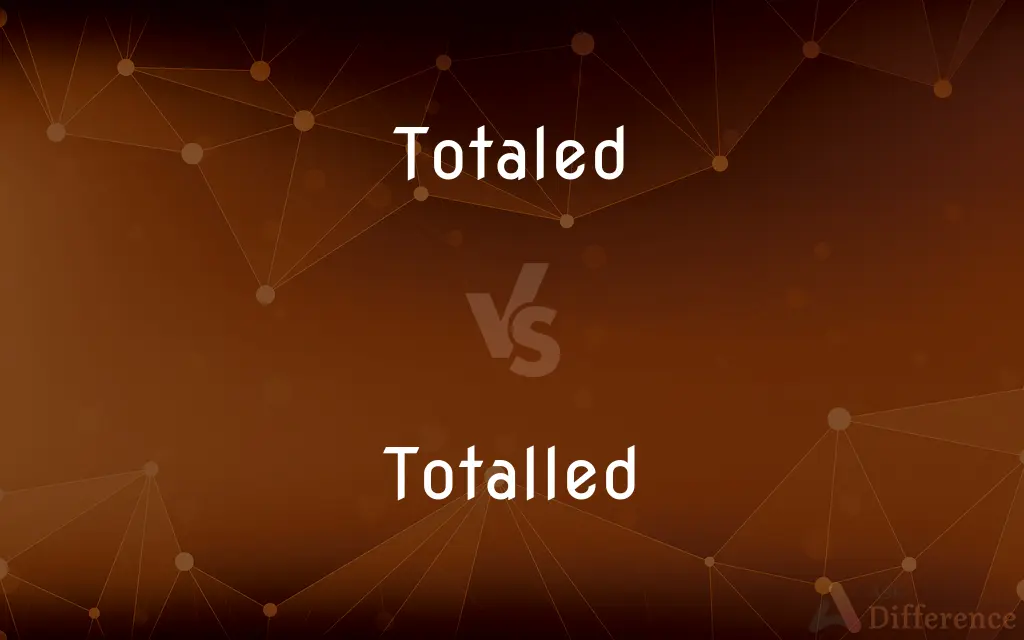Totaled vs. Totalled — What's the Difference?
By Fiza Rafique & Maham Liaqat — Updated on March 20, 2024
Totaled is the preferred spelling in American English for expressing something summed up or destroyed, while totalled is favored in British English.

Difference Between Totaled and Totalled
Table of Contents
ADVERTISEMENT
Key Differences
Totaled is commonly used in American English to describe when numbers are added up to a total or when a vehicle is so damaged it's considered a loss. On the other hand, totalled, with a double "l", is the spelling preferred in British English for the same contexts, reflecting a common pattern in American and British spelling differences.
When it comes to documentation or formal writing, the choice between totaled and totalled can depend on the regional spelling standards being adhered to. While totaled is succinct and aligned with American English conventions, totalled follows the British practice of doubling the consonant when adding suffixes to verbs ending in a vowel plus a consonant.
In casual communication, such as emails or messages, the distinction between totaled and totalled may not be as significant, and usage can vary more freely. However, in professional or academic contexts, consistency with the chosen English variety is essential.
While the spelling differs, the pronunciation of totaled and totalled remains largely the same, minimizing confusion in spoken language. The primary difference lies in the orthographic conventions of American versus British English.
The choice between totaled and totalled does not affect the meaning of the word or its use in sentences; it merely reflects regional spelling preferences. Both forms are understood universally, regardless of the spelling variation.
ADVERTISEMENT
Comparison Chart
Spelling
Single "l"
Double "l"
Usage
Preferred in American English contexts
Preferred in British English contexts
Meaning
To sum up to a total or to damage beyond repair
Same as "totaled", with no difference in meaning
Pronunciation
Same for both variations
Same for both variations
Context
Used in formal and informal American English writing
Used in formal and informal British English writing
Compare with Definitions
Totaled
To add up amounts to a total sum.
The cashier totaled the items to find the final bill.
Totalled
The British English spelling for summing amounts.
The accountant totalled the invoices.
Totaled
To describe a vehicle damaged beyond repair.
After the crash, the car was totaled.
Totalled
Describing a vehicle so damaged it's considered a total loss.
The vehicle was totalled in the accident.
Totaled
To bring to a total; to sum up.
The annual report totaled the year's earnings.
Totalled
To accumulate to a total amount.
Donations totalled over a million dollars.
Totaled
Used in accounting to indicate the summing of figures.
We totaled the expenses for the month.
Totalled
Used in financial contexts to indicate aggregation of amounts.
Profits totalled to a significant increase this quarter.
Totaled
In informal contexts, to describe complete destruction.
The storm totaled the small coastal village.
Totalled
Informally, indicating extensive damage or destruction.
The fire totalled the historic building.
Totaled
An amount obtained by addition; a sum.
Totalled
An amount obtained by addition; a sum.
Totaled
The whole amount of something; the entirety
The storm damaged the total of the housing units.
Totalled
The whole amount of something; the entirety
The storm damaged the total of the housing units.
Totaled
Of, relating to, or constituting the whole amount; entire
The total population of the city.
Totalled
Of, relating to, or constituting the whole amount; entire
The total population of the city.
Totaled
Complete; utter; absolute
Total concentration.
A total effort.
A total fool.
Totalled
Complete; utter; absolute
Total concentration.
A total effort.
A total fool.
Totaled
To determine the total of; add up
They totaled the applications at 600.
Totalled
To determine the total of; add up
They totaled the applications at 600.
Totaled
To equal a total of; amount to
The week's receipts totaled more than $90,000.
Totalled
To equal a total of; amount to
The week's receipts totaled more than $90,000.
Totaled
To wreck completely; demolish
The driver survived the crash but totaled the car.
Totalled
To wreck completely; demolish
The driver survived the crash but totaled the car.
Totaled
To add up; amount
It totals to $25.
Totalled
To add up; amount
It totals to $25.
Totaled
Simple past tense and past participle of total(US spelling)
Totalled
(British) total
Totaled
(especially of a vehicle) destroyed
Totalled
Destroyed
Several totalled cars were being picked over for usable parts.
Totaled
Used of automobiles; completely demolished;
The insurance adjuster declared the automobile totaled
Common Curiosities
Can "totaled" and "totalled" be used interchangeably?
They can be used interchangeably in terms of meaning, but the choice of spelling should align with the regional English standard being followed.
Is "totalled" a correct spelling?
Yes, totalled is the correct spelling in British English.
Why does American English use "totaled" while British English uses "totalled"?
The difference reflects broader spelling conventions in American and British English, particularly in handling verbs ending in a vowel plus a consonant when adding suffixes.
What does "totaled" mean?
Totaled means to sum up to a total amount or to describe a vehicle damaged beyond repair.
Can "totaled" be used in non-financial contexts?
Yes, "totaled" can be used informally to describe anything destroyed or damaged beyond repair, not just in financial contexts.
Is the use of "totalled" in American English considered incorrect?
While not necessarily incorrect, "totalled" is less common in American English, and "totaled" is the preferred spelling.
Can software spell checkers detect the use of "totaled" vs. "totalled"?
Yes, most spell checkers can detect the use based on the language setting (American or British English) of the software.
In what contexts is "totaled" most commonly used?
Totaled is often used in financial contexts, insurance descriptions, and informal speech to indicate summing up or significant damage.
Are there other words that follow a similar spelling pattern as "totaled" and "totalled"?
Yes, words like "canceled" (AmE) vs. "cancelled" (BrE) follow a similar pattern.
Does the choice between "totaled" and "totalled" affect pronunciation?
No, the pronunciation of totaled and totalled is largely the same.
How should I decide which spelling to use when writing for an international audience?
When writing for an international audience, consider the primary audience's preference or choose one standard and use it consistently throughout your text.
Is it important to know the difference between "totaled" and "totalled"?
Understanding the difference is useful for maintaining consistency in writing and for recognizing regional spelling variations.
Are there any rules for when to use "totaled" vs. "totalled"?
The main rule is to be consistent with the regional spelling standard: American English favors "totaled," while British English prefers "totalled."
Does using "totaled" in British English writing indicate Americanization?
Using "totaled" in British English could be seen as an American influence, although it's more important to be consistent with the chosen language standard throughout a text.
Is there a preference for "totaled" or "totalled" in academic writing?
The preference in academic writing depends on the style guide being followed, which usually aligns with either American or British English conventions.
Share Your Discovery

Previous Comparison
Total vs. Overall
Next Comparison
Yak vs. OxAuthor Spotlight
Written by
Fiza RafiqueFiza Rafique is a skilled content writer at AskDifference.com, where she meticulously refines and enhances written pieces. Drawing from her vast editorial expertise, Fiza ensures clarity, accuracy, and precision in every article. Passionate about language, she continually seeks to elevate the quality of content for readers worldwide.
Co-written by
Maham Liaqat













































